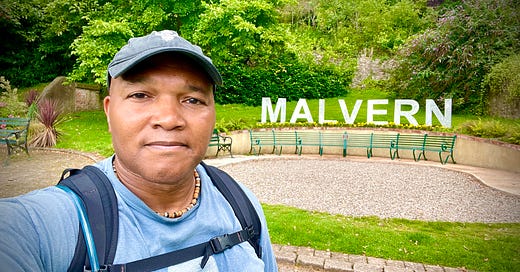(1)
The Barefoot Philosopher is taking over. You may have noticed the name change from the Coach's Notes to the Barefoot Philosopher's Notes. I've been hemming and hawing about this for a few weeks. I'm trying to make my external reality congruent with my internal reality. The voices, both internal and external, are telling me that my philosophical orientation is anachronistic, maybe even a fool's errand, but it seems right for me. And in the end, that's what matters. You probably saw it coming anyway, as the Notes have been shifting in direction and tone for a few issues now.
Philosophy, in its purest form, is all about personal growth. Socrates encouraged us to examine our lives. For him, the examination of life was not just a pastime but the very essence of human existence. By interrogating the principles and beliefs that guide our actions, we embark on a journey towards self-awareness, and through relentless questioning and conversations, we unmask our ignorance and reveal our inner wisdom. By examining our lives, we become architects of our own destiny, shaping our values and our actions along the way. We learn to separate ourselves from the conscious robots we’ve become and reveal our authentic selves—who we truly are, not who we've been programmed to be.
Centuries ago, Socrates said, "The unexamined life is not worth living." And here I am, still engaging with his ideas and wrestling with his insights. This is a true testament to the timelessness of philosophy and philosophical inquiry. It's a reminder that the questions are sometimes more valuable than the answers, which, for me, is what philosophy is all about.
(2)
Why "barefoot"? Well, it's a term that suggests a connection to the Earth, a grounded approach, and a casual, unpretentious style. It evokes images of walking freely and experiencing the world without barriers and suggests a philosophy that's accessible and down-to-earth. I'm hoping it'll attract people who seek a natural and organic connection to philosophy. People who are happy to pursue philosophical inquiry through a relaxed conversation rather than the lecture hall. This totally reflects my desire to convey an informal style of philosophical study. It carries the warmth of a walk through nature and the openness of a heart-to-heart conversation sat around a campfire or in a pub or cafe—wisdom without walls. How does this term resonate with you?
(3)
Let's get into it.
(4)
Try not to be owned by the things you own. I came across this piece of wisdom the other day while reading the Socrates Express.
It's an age-old piece of wisdom that warns against the entanglement of our identities with the material objects we surround ourselves with. In one sense, the things we own often act as extensions of ourselves. Our homes, our cars, and our clothing reflect our choices, our values, and our status in society. But to what degree do they come to own us? When does the possession of things shift from serving our needs to defining our being? Who are you without the things you own?
Materialism, the preoccupation with possessions, could be seen as a trap, binding us to a constant cycle of desire and satisfaction. A new phone, a bigger house, a faster car—each achievement seems to be shadowed by a new want or need. The line between 'wanting' and 'needing' becomes blurred, and suddenly, we find ourselves slaves to a never-ending pursuit of more.
How often do you catch yourself saying, "I need this..." Followed by "because..." We justify why we "need" the things we want. I'm guilty of this, especially when it comes to tech. For example, I bought these this morning, even though I have a perfectly good working pair. In fact, I made this with them a few days ago. The problem is that they don’t have the bells and whistles of the new model. They don't have a way to monitor the audio levels, nor do they allow me to add a low-pass filter or store the recording on the actual device instead of on my phone. I have a long list of reasons to justify why I "need" this new set. But do I really need them?
Consider the child clutching a toy. To the child, the toy might seem to be a part of their very essence, a reflection of joy and identity. But with maturity comes the realisation that the toy is simply an object, separate from the self. Can this wisdom be applied to our relationships with all material things? Is it possible to interact with our possessions without them defining us or becoming possessed by them?
I know somewhere that there’s a balance between enjoying the things we own without letting them consume us. The ancient Stoics, notably Epictetus, had thoughts on this matter. They said that we don't really own anything; everything is borrowed from the universe, and it can be taken away at any time. According to this philosophy, the wise person takes care of their possessions but remains detached from them with the understanding that their loss is inevitable.
If you feel like your possessions own you, how might you untangle yourself from them and reclaim your identity separate from these things?
(5)
Sometimes our identities get hijacked by the need for validation.
This happens a lot with social media and the algorithms that sustain the feeds. Social media functions in a way that amplifies our preferences, reflecting them back at us and creating a comforting but isolating echo chamber. You could argue that this phenomenon weaponises our own nature against us. The "likes" we give and receive shape the content we encounter, gradually moulding our perspectives, reinforcing our beliefs, and, in some cases, narrowing our world view.
Validation acts as a healthy form of social interaction and feedback. On the other extreme, it becomes an addictive force, shaping our thoughts, actions, and sense of self. You could say social media has turned us all into performers on a stage, playing to an audience's expectations rather than living our truth. I am aware of this fact every time I make a video to post on Instagram, fitting my thoughts into a 60-second soundbite!
Is the quest for validation an innate human trait? We want to be seen. We need to be seen. We want to feel like we matter and that our lives matter. There's something innate in us that longs for connection, understanding, and existential affirmation.
This Affirmation acts as a mirror for both our vanity and our vulnerability. The challenge, then, lies in recognising when the scales have tipped too far, when the quest for validation becomes a force that owns us rather than a natural expression of our social nature.
(6)
Remove the shackles, whatever form they might take. These shackles may be conceptualised as ignorance, prejudice, or false beliefs that limit our understanding and awareness of the world around us. In Eastern philosophy, especially within the context of Buddhism, the shackles could be the attachments that bind us to the cycle of suffering and rebirth.
How do we identify our own shackles? Some of these shackles we cling to out of fear or comfort.
Imagine a man who clings to a job he hates, fearing the uncertainty of a new path. The chains he wears are of his own making, forged from his fear of financial instability or failure. He fails to realise that these very chains inhibit his stability by blocking his possibility for growth, passion, and fulfilment.
Or consider a relationship where love has withered, but the fear of loneliness keeps two souls bound together in a permanent state of discontent. Here, too, the chains are willingly worn. The fear of solitude eclipses the yearning for authentic connection. These chains become the guardians of a well-worn comfort zone, holding the couple back from the raw and unpredictable beauty of true intimacy.
Fear and Comfort are the guardians at the gate of freedom. You have to face them both if you want to break the shackles that bind you and move forward towards the destiny you know you deserve.
What shackles are you willingly wearing under the pretence that they will keep you safe?
(7)
More change. I've redesigned the companion website to these notes. The website is the central focus of all of my web activity. It's my home base on the Internet. You can link to it directly via RSS if you want to stay current with my podcasts, posts, and videos.
Posts you may have missed:
The art of paying attention: what Sappho's poetry teaches us
A pathway back to our natural state
From the Wisdom Experience Podcast
Navigating isolation and building mental wealth with Mike Pagan
The Mischief Movement with Zoe Greenhalf
(8)
Let's chat!
Or send me an email.
(9)
If you're a raving fan, here's how you can support the work and creativity that go into the Notes, podcasts, videos, and blog posts.
And a really easy way to support the work is to use my Amazon affiliate link if you’re buying anything from Amazon. It doesn’t cost you a penny extra, but it gives me a small percentage of whatever you purchase. Full disclosure: all of the book links in the notes are Amazon affiliate links.
The easiest way of all to support the Notes, and it won’t cost you a dime, is to share the notes with your network. Recommend the Notes to a friend, or better yet, pull one of the questions out of today’s issue and have a conversation about it with a close friend.
(10)
That’s all for now, good people. I hope you enjoyed The Notes today. It’s Friday, so enjoy your weekend. I hope the weather plays nicely for you. I’m hoping to go for a solo hike in the Cotswolds this weekend.
Your barefoot philosopher friend,
Clay




